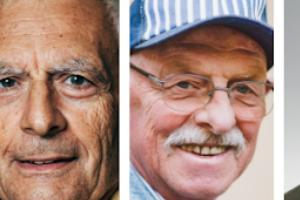Prostate Cancer: Treatment And Active Surveillance
Published 19 Nov 2018 • By Louise Bollecker
At 76 years of age, @JEGEREMONK has had prostate cancer since 2009. For Prostate Cancer Month, Movember, he agreed to talk to us about his treatment, his active surveillance, and alternative treatments he has used to best combat the disease and become a force in his cure.

How did you find out you had prostate cancer?
That was in 2009, following adenoma symptoms. I consulted a urologist, my PSA level was elevated. Then I had a transrectal biopsy.
Are you currently on any treatment? If so, how is it going?
In 2010, I had a transurethral resection followed by rather unpleasant bladder hemorrhage complications. In 2015, my PSA was again elevated and I was placed under active surveillance of prostate cancer, i.e. without treatment. Since then, several times my PSA level has become elevated; I have had 2 MRIs and 1 transperineal biopsy to confirm the return of cancer but it is still intraprostatic, localized, not very widespread and not very aggressive (gleason 3+3).
Active Surveillance is not very restrictive but psychologically it is difficult to bear without a satisfactory therapeutic option. The transrectal ultrasound treatment which would be a good solution, is not in my case because it is too close to the urethra which could be damaged. Radiotherapy or surgery remain on hold because of the significant inconveniences and side-effects.
In December, I will have another prostate MRI that I hope will be favorable, as was my last PSA test.
This diagnosis has inevitably had an impact on my relationships with my loved ones since it is such time-consuming, worrisome, and depressing for me, and thus, indirectly for my partner.
Prostate cancer is sometimes a taboo for men. Have you had any concerns about your virility or impotence?
Yes, but I am not useless... lol... I no longer have prostate ejaculation but only glandular ejaculation, i.e. limited in volume and fertility (but having children is no longer relevant!)
What message would you like to send to men who have recently been screened?
First, begin treatment as soon as possible! Then begin making changes, do not be passive... You must be active: focus on your diet, dietary supplements, physical activity and especially thermotherapy, even if some of this does not have the support of the medical community and is not scientifically proen.
If only for psychological relief, at least feel like you are acting engaging in your cure, otherwise you will feel consumed and abandoned by the doctors and medicine... The medical treatments certainly have convincing results, but they also have a host of unavoidable side effects and potentially disabling complications. The doctor, or even the oncologist, should support the patient in this regard and not sit back or watch passively. Medical treatment should have better follow-ups and the doctors should treat you more as a person than a disease.
Can you tell us more about active surveillance?
Active surveillance, which is currently the norm in the care process, consists of monitoring: PSA, MRI, biopsies, clinical examinations, etc... before starting any surgical treatment, radiotherapy or any new treatments/examinations, such as high energy ultrasound.
In my opinion, such treatment should, even if only for the psychological comfort of the patient, be supplemented by other methods not scientifically proven because, at least for the psychological aspect, it can give the patient a feeling of some support, which is and beneficial, as long as such alternative treatments are not harmful otherwise.
Such alternative methods are diet, physical activity, and supplements.
You have mentioned diets. What diets specifically?
Commonly recommended diets are low in carbohydrates, fat, animal red meat protein, deli meats, dairy products, etc... but rich in vegetable protein or fatty fish, green vegetables and red fruits, etc.... They may be more specific as a KETO diet, for example, or even as a more or less rigorous fast.
What is thermotherapy?
Thermotherapy consists in locally heating the tumor at around 42° C by non-radioactive radiation; it is not recognized but it is practiced in the United States, Germany, Holland, Switzerland, etc. I have not had to use it and am only considering it as part of an active management of my case.
I would eventually like to use it before more "medically recognised" treatments, which are effective but are very strong and can be potentially accompanied by serious side effects.
There is absolutely no way that these complementary alternative treatments can replace medical treatment, but I say, I believe these methods do help and can possibly help reduce the advancement of prostate cancer.

 Facebook
Facebook Twitter
Twitter


